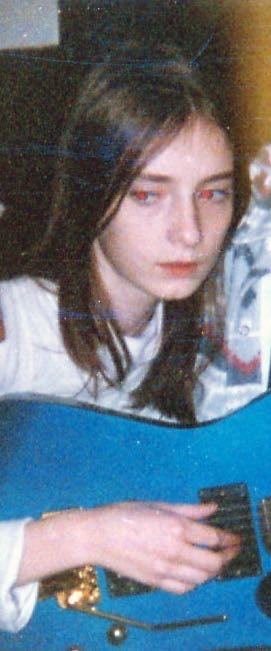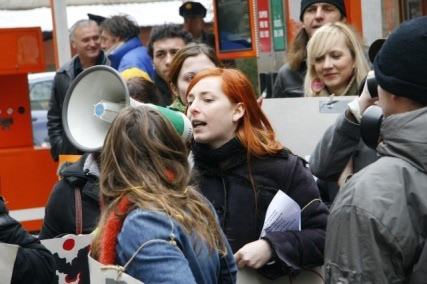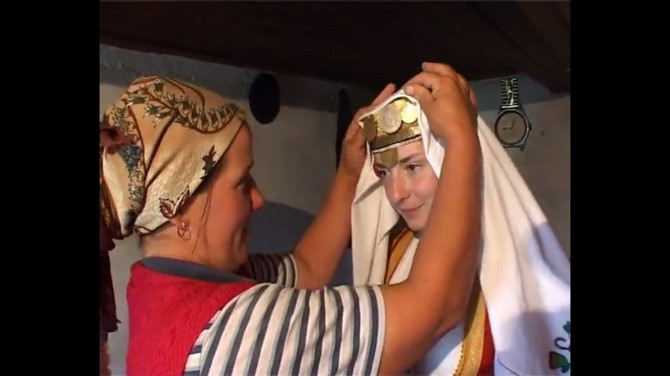


I grew up in Bosnia. I used to walk or ride a bicycle around 10 kilometers every day to get to the high school, and then come back home crossing another 10 kilometers through some of the most dangerous parts of the city, which were exposed to sniper shootings and grenades.
Still, I had dreams of many things, including wanting to be in an all-girls heavy metal band. After high school graduation I stopped pursuing music, feeling overwhelmed with the ongoing processes which were re-shaping and changing the society, people and environment, and at 18 years old, not really finding my place anywhere. My old teacher motivated me to study literature because I was very passionate about writing.
That is how I enrolled as a student of world literature. I continued with writing and sharing some of my darkest experiences in forms of diaries, papers, and letters. My audience (family, friends, teachers) was small but invaluable. During my student days I was inspired by harsh Dostoevsky's realism, Ibsen’s characters, and Sylvia Plat's existentialism.
And then I discovered the world of documentaries. Around the age of 18 I was selected as one of the protagonists for the documentary film ‘Ragazzi di Sarajevo’ (Children of Sarajevo) directed by Italian documentary filmmaker, Daniela Cavini, who later became one of my best friends for life. In ‘Children of Sarajevo’ I shared some of the most painful experiences about war time, and I also learned about the importance of having one’s voice heard and sharing that voice with the rest of the world. I was also selected as one of the protagonists of the documentary film ‘Visa for Sarajevo’ which dealt with the lives of young people in a post-war environment. By working in different media at that time and being editor-in-chief of a cultural fanzine and guide, I was more and more exploring the strengths of visuals in articulating the lives of people, their stories and society.
Nevertheless it took me years after that to find the form which would be a transcendent channel for my voice. It was not only about finding the form. It was also about finding the courage to share and ‘occupy’ public space, to expose sensitivities, fears, traumas, experiences, all of them through conscious statements about society, community, norms, values.
It did not happen until I got involved into feminist activism through street actions, feminist art festivals and a number of various human rights campaigns. Articulation of continuous violence and discrimination against women in post-war Balkan’s society further shaped my visions and views.
After co-directing and co-producing my very first documentary film, which depicted lives of women in a small village, exploring the engaging art and articulating social and human rights issues through documentary perspective, became one of my main forms of personal expression.
Soon after that I got involved with LGBTIQ activism and helped with the media campaign during the organization of the very first queer festival (by Organization Q) in my home town. The result of that was another documentary film and deep disappointment caused by verbal and physical violence which occurred before, during and after the opening of the event. Shortly after that I left Bosnia. My plan to leave the country had been a long-term plan, alive and present since the first days of war. Experiencing the migration, being alone and building my own space in a new country, being in survival mode many times and then losing my beloved mother, strengthened this passion and importance of not giving up one’s creative force and finding myself a place in the world as a woman, artist, humanist, activist, educator, mother.
Throughout the years of my doctoral studies in film and audio-visual field, I discovered other aspects of visual aesthetics which inspired not only my teaching engagement but also influenced my body of work which diverted towards reflection, exploring my own past, relationships, and diving deeper into the space within. I seek for many answers, and after making enough physical distance from physical space which was and still is so traumatized by war, I finally started with establishing a dialogue with an internalized past and the outside world through a visual plane.
The result of that was that I began working on a series of visual narratives constructed through personal images. For the past several years, I have been continuously creating and sharing personal narratives.
I still see a teenage girl who rides a bicycle on her way to the school, escaping snipers and mortar shells in order to escape into a different world at least for a moment, to escape into something creative and profound. Yes. Sharing the voice and darkest places of our soul can be overwhelming, and can be scary and frightening. It can make us vulnerable and exposed, but it also deepens our own individuation, awakening a continuous awareness of caring and nurturing stories and experiences that need to be told.
OFFICIAL BIOGRAPHY
Masa Hilcisin is a visual artist, educator, and somatic movement therapist in training.
Her professional background includes work for media, cultural and human rights organizations where her interests were centered around post-war feminist scene, cultural activism, media research and gender - based violence.
She has been making documentary films, experimental videos, and other visual forms on personal narratives and social issues for more than 20 years. Her works have been screened and exposed at various film festivals and exhibitions around the world.
In 2015, with a group of artists and friends, Masa co-founded SWAN, an international women’s art festival in Prague.
She teaches creative media production at Prague City University, whose curriculum engages with social issues, personal storytelling, and visual narratives. She additionally teaches film directing, documentary film production and experimental cinema at Prague Film School.
Masa also worked with the Society for Creativity in Education (Společnost pro kreativitu ve vzdělávání), whose mission focuses on bringing, supporting, and developing creative education in schools.
She is co-founder of Media & Film Initiative with Touching Lives, non-profit organization based in Mumbai, India, which work towards Learning and Healing of children and people of slum communities, supporting them to become independent learners.
For the past several years, Masa has been running visual storytelling workshops for women and girls in Czech Republic, Georgia, India, and Mexico.
In 2020, she started to work on a series of books for children dealing with stigma, prejudices, and stereotypes. She collaborates with the Association of Foster Families through creative projects and initiatives with children.
She is a founder and director of the organization World Community Connect that aims to cultivate plurality of all people regardless of gender, race, sexual orientation, ethnicity, religion, or age through community art projects, creative initiatives, and other educational programs with communities across the world.
Education:
PhD, Theory and History of Theater, Film and Audio-Visual Culture Studies | Masaryk University
MA, European Studies | Univerziteta u Sarajevu, Università di Bologna
Diploma in Holistic Integrated Creative Arts Therapy | Mind Body Education (Global) Pty Ltd.
Postgraduate Certificates in Meditation Therapy, Meditation for Children | Mind Body Education (Global) Pty Ltd.
VĚDOMÉ TĚLO - Somatické umění pohybu a Somatické terapie (CONSCIOUS BODY - Somatic Art of Movement and Somatic Therapy) | DanceLab Studio (Study in progress)
PUBLISHING
"Vae Victis" Na – Strani, Zbornik radova o seksualnosti (Collection of Works about Sexuality) 2007
"Women at Work" Humour Works Reader/City of Women, Ljubljana, Slovenia, 2007
Human Rights in Practice In "Human Rights in Bosnia and Herzegovina 2008: Legal Provisions, Practice and International Human Rights Standards in the Bosnia and Herzegovina" with Public Opinion Survey, 2009
"(Re)presentation of Women in Contemporary Bosnian Cinema", Bread and Roses/Zagreb, Croatia, 2009
"Queer Representation in Post - Yugoslav Cinematography", Prague College: CRIS Bulletin, Centre for Research and Interdisciplinary Studies, 2012
Short Story "Balcony" (Balkon) Presented at the Solo exhibition of photography by Milomir Kovacevic Strasni, April 2017
"Women Documentary Filmmakers: Framing War and 'Post-conflict' Zones", Prague College: CRIS Bulletin, Centre for Research and Interdisciplinary Studies, 2017
"TARA" - Story about me and my mom, who was born a boy", Book for children, Community Connect, Prague, May, 2021
"KLARA" - Published by the, Association of Foster Families, Prague, September, 2022